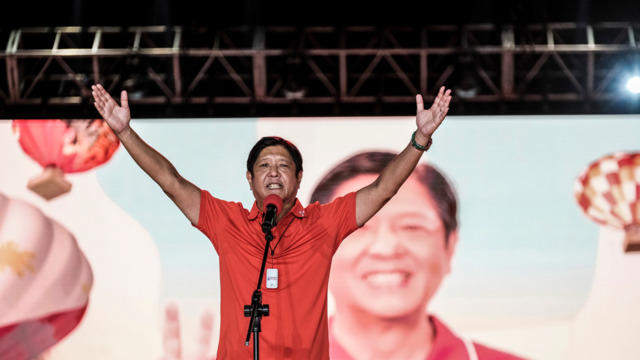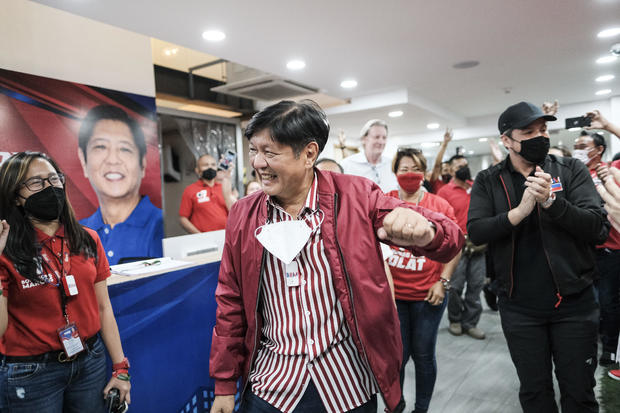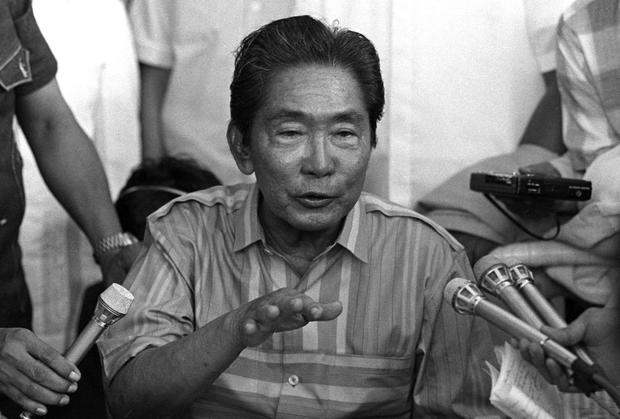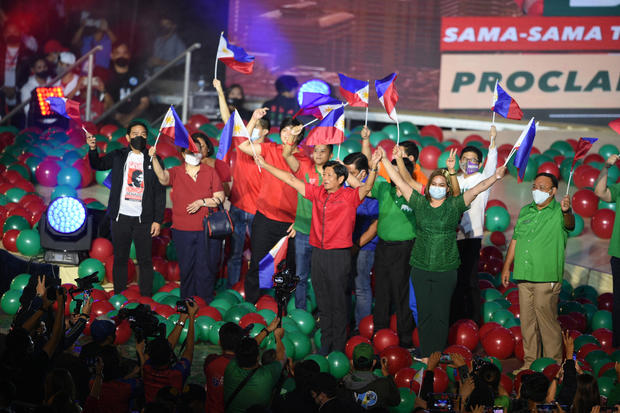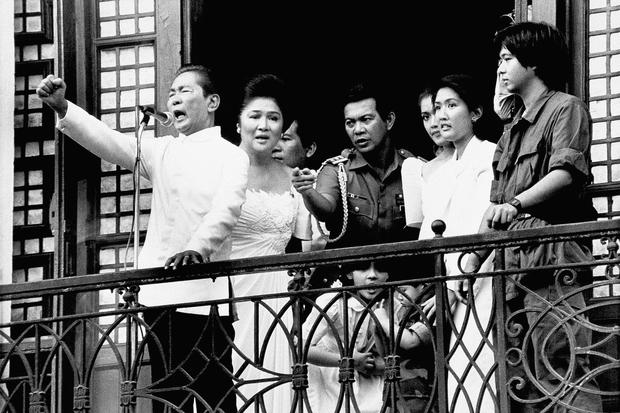▶ Watch Video: Ferdinand Marcos Jr. expected to win Philippines presidential election
Manila — The Marcos family, famously driven from power and out of the country in 1986 by Filipinos fed up with 21 years of Ferdinand Marcos’ authoritarian rule, inched ever closer to a remarkable return to power on Tuesday. An unofficial tally showed the son and namesake of the late dictator, who goes by his boyhood nickname “Bongbong,” had garnered a record number of votes in Monday’s presidential election.
With more than twice the ballots of his closest rival, Ferdinand “Bongbong” Marcos Jr.’s lead looked insurmountable.
It’s a staggering comeback for one of Asia’s most infamous political families. After six years of populist rule under outgoing President Rodrigo Duterte — who has been accused of authorizing extrajudicial killings of drug dealers — there was huge support for Bongong’s challenger, current Vice President and human rights lawyer Leni Robredo.
But she was no match for the Marcos machine.
The elder Marcos gained infamy as one of the worst plunderers of public money in global history, hoarding and splurging an estimated $5 billion to $10 billion in Philippine government funds. His administration was marked by human rights abuses, too, with some 70,000 people jailed, 34,000 tortured, and more than 3,000 killed according to Amnesty International.
But supporters brushed aside those crimes of the father either as fiction, or actions for which the son could not be held accountable. Like his campaign, they chose to focus instead on the infrastructure built during the first Marcos’ years in power, which they believe has been missing during the successive governments management of the country.
Many clearly headed to the polls hoping that Bongbong would continue that part of his father’s legacy.
“How many presidents have come and gone? Are there more heart centers and lung centers?” Gregorio Cagurangan, who lived through the draconian Martial Law years under the first Marcos but was happy to focus on the other aspects of that era, told CBS News as he cast his vote for Bongbong.
Analysts said Sara Duterte, the daughter of the current president and the mayor of Davao City, helped garner support for Marcos Jr. by joining him on the ticket as his pick for vice president.
But the Marcos family’s online disinformation and propaganda machine has been around far longer.
“Since their return in 1991, the Marcoses have invested in trying to gloss over the excesses of the Marcos regime, in trying to propagate very positive, sort of mythical notions of the Marcos era,” Sheila Coronel, a veteran Philippine journalist and professor at the Columbia School of Journalism, told CBS News.
On Monday evening, Marcos Jr. appeared on national television and social media to thank his supporters, but he stopped short of declaring victory.
“There are thousands of you out there who cast their lot with us, because of their belief in our message of unity,” he said.
But Bongbong has done very little to explain how he plans to achieve his goal of delivering unity with justice still being sought by victims of his father’s abusive rule.
“It’s ironic, because both Bongbong and Sara Duterte are polarizing figures,” Coronel told CBS News.
As the vote tally showed them surging on Tuesday, university students joined older victims of the Martial Law years under Marcos Jr. to stage a protest outside the national election commission’s office in Manila.
“I am not going to have my president be named Ferdinand Marcos again, ever,” insisted Frankie Pangilinan, the 21-year-old daughter of Robredo’s running mate, Senator Francis Pangilian.
In the end, she may have little choice.
So what will a new Marcos regime in the Philippines mean for ties with the rest of the world?
Analysts believe Bongbong is more likely to try to build on current President Duterte’s populist appeal than he is to fall back on his father’s strict authoritarian ways.
Like Duterte, who’s drawn scorn from Washington with his harsh actions and rhetoric, Marcos Jr. is seen as a man unlikely to cozy up to the United States. While the U.S. is a treaty ally of the Philippines and Maros’ family was forced into exile there, Bongbong may never even try to set foot on American soil again.
He faces contempt charges in the U.S., along with his mother Imelda, over his family’s bilking of the Philippine’s public wealth decades ago.
If he can’t or won’t try to deepen ties with the U.S., many suspect Marcos Jr. will look elsewhere for powerful allies, and that could have ramifications for Washington as it grapples with a delicate power balance in Asia.
“A Marcos presidency would mean the Philippines being closer to China,” Coronel told CBS News, “and definitely not wanting U.S. or Western criticism.”















